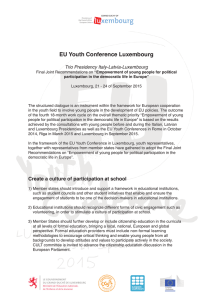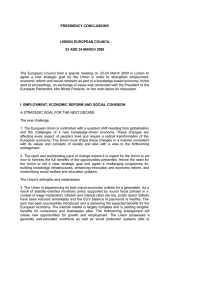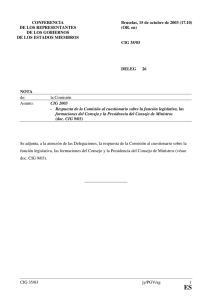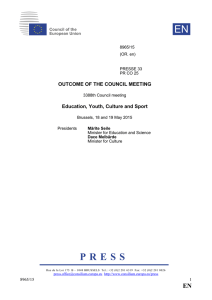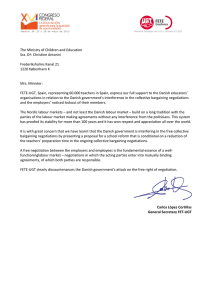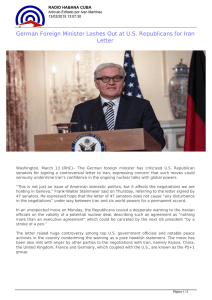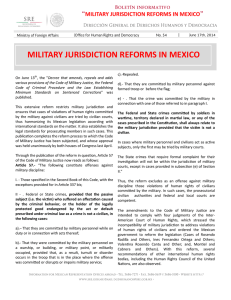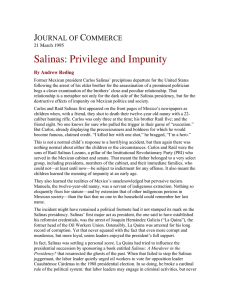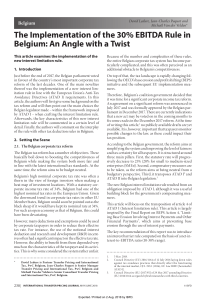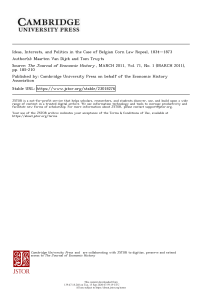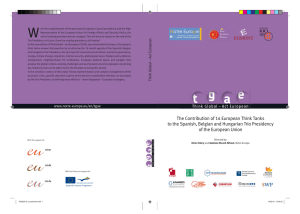TEPSA Recommendations to the Belgian EU Council Presidency
Anuncio
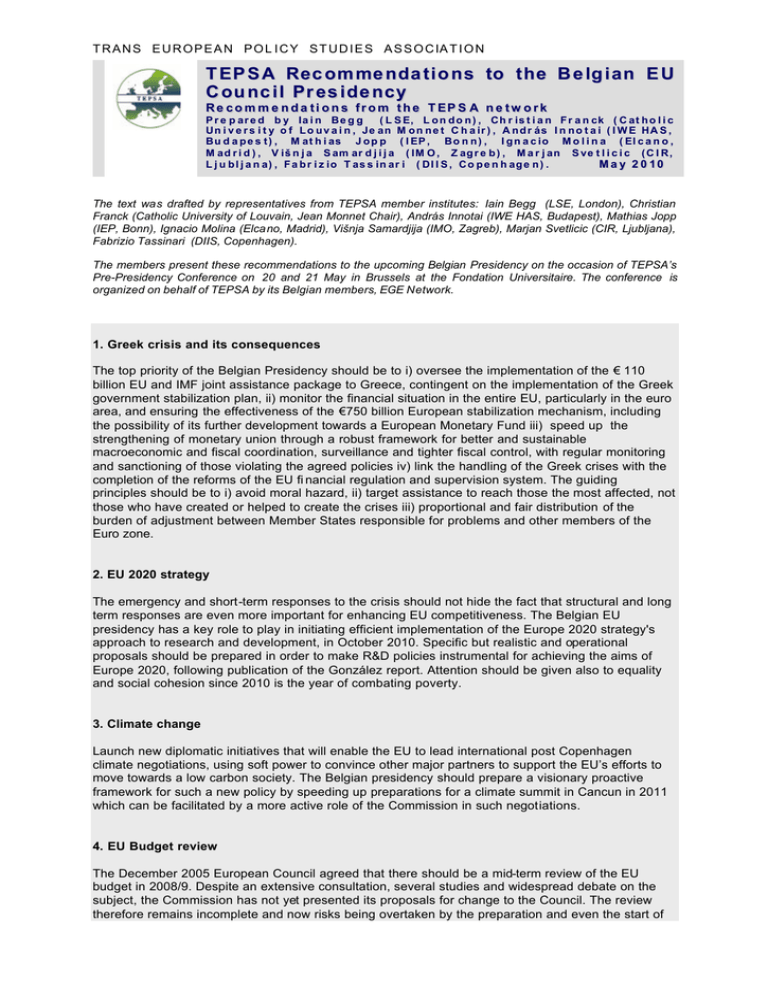
T R A N S E U R O P E A N P O L I C Y S T U D I E S A S S O C IA T I O N T E P S A R e c o m m e n d a t i o n s to t h e B e lg i a n E U C ou nc il Pr es ide ncy Re c o m m e n d a ti o n s fr o m th e T EP S A n e tw o r k P r e p ar e d b y Ia i n Be g g ( L S E, L o n d o n ) , C h r i s t i a n F r a n c k ( C a t h o l i c Un i v e r s i t y o f L o u v a i n , Je an M o n n e t C h a ir ) , A n d r ás I n n o t a i ( I W E HA S , B u d a p e s t ) , M a t h i a s J o p p ( I EP , B o n n ) , I g n a c i o M o l i n a ( El c a n o , M ad r i d ) , V iš n j a S am ar d j i j a ( IM O , Z ag r e b ) , M a r j an S ve t l i c i c ( C I R, L j u b l j a n a) , F a b r i z io T as s in ar i ( DI I S , Co p e n h ag e n ) . M a y 2 0 10 The text was drafted by representatives from TEPSA member institutes: Iain Begg (LSE, London), Christian Franck (Catholic University of Louvain, Jean Monnet Chair), András Innotai (IWE HAS, Budapest), Mathias Jopp (IEP, Bonn), Ignacio Molina (Elcano, Madrid), Višnja Samardjija (IMO, Zagreb), Marjan Svetlicic (CIR, Ljubljana), Fabrizio Tassinari (DIIS, Copenhagen). The members present these recommendations to the upcoming Belgian Presidency on the occasion of TEPSA’s Pre-Presidency Conference on 20 and 21 May in Brussels at the Fondation Universitaire. The conference is organized on behalf of TEPSA by its Belgian members, EGE Network. 1. Greek crisis and its consequences The top priority of the Belgian Presidency should be to i) oversee the implementation of the € 110 billion EU and IMF joint assistance package to Greece, contingent on the implementation of the Greek government stabilization plan, ii) monitor the financial situation in the entire EU, particularly in the euro area, and ensuring the effectiveness of the €750 billion European stabilization mechanism, including the possibility of its further development towards a European Monetary Fund iii) speed up the strengthening of monetary union through a robust framework for better and sustainable macroeconomic and fiscal coordination, surveillance and tighter fiscal control, with regular monitoring and sanctioning of those violating the agreed policies iv) link the handling of the Greek crises with the completion of the reforms of the EU fi nancial regulation and supervision system. The guiding principles should be to i) avoid moral hazard, ii) target assistance to reach those the most affected, not those who have created or helped to create the crises iii) proportional and fair distribution of the burden of adjustment between Member States responsible for problems and other members of the Euro zone. 2. EU 2020 strategy The emergency and short-term responses to the crisis should not hide the fact that structural and long term responses are even more important for enhancing EU competitiveness. The Belgian EU presidency has a key role to play in initiating efficient implementation of the Europe 2020 strategy's approach to research and development, in October 2010. Specific but realistic and operational proposals should be prepared in order to make R&D policies instrumental for achieving the aims of Europe 2020, following publication of the González report. Attention should be given also to equality and social cohesion since 2010 is the year of combating poverty. 3. Climate change Launch new diplomatic initiatives that will enable the EU to lead international post Copenhagen climate negotiations, using soft power to convince other major partners to support the EU’s efforts to move towards a low carbon society. The Belgian presidency should prepare a visionary proactive framework for such a new policy by speeding up preparations for a climate summit in Cancun in 2011 which can be facilitated by a more active role of the Commission in such negotiations. 4. EU Budget review The December 2005 European Council agreed that there should be a mid-term review of the EU budget in 2008/9. Despite an extensive consultation, several studies and widespread debate on the subject, the Commission has not yet presented its proposals for change to the Council. The review therefore remains incomplete and now risks being overtaken by the preparation and even the start of T R A N S E U R O P E A N P O L I C Y S T U D I E S A S S O C IA T I O N negotiations on the next Multi-annual Financial Framework, the first one according to the Lisbon Treaty which would necessitate much stronger inter institutional cooperation. We urge the Belgian Presidency to ensure that the budget review is rapidly and properly concluded and that it results in substantive proposals for reform of the budget, including CAP and linking reform of the budget with the implementation of the Europe 2020 strategy. 5. Agriculture and natural resources The formal discussion on post 2013 CAP will start during the Belgian semester. The presidency can support the reform discussion and introduce into CAP negotiations new social and development priorities; transformation of the sectoral approach into a policy for securing public goods and services provided by agriculture. These include environmental protection, sustainable use and management of natural resources, conservation of biodiversity, soil fertility, landscape preservation, food safety, animal and plant health, and rural development, water quality, resulting in the preparation of a European Biodiversity Strategy for the period from 2010. This can be done also by a smaller budget for CAP but with re-orientation of spending, redistribution of its funds among members and focusing on i) payments delivering public goods and ii) gradual elimination of direct payments from the CAP’s first pillar, while those policies that promote genuine European public goods should be retained (the second pillar). 6. New institutional set up in action The Lisbon Treaty introduced a tectonic change in the organization of the Council of the EU. After the transitional experience of the Spanish Presidency, the Belgian Presidency is well placed to start looking into the problems of overlap in the new architecture and possible problems in implementation, so as to be able to improve its functioning as an ongoing process and contribute to the consolidation of the new architecture. Belgium should use the opportunity to build upon the experiences of the Spanish Presidency on a reasonable division of labour between the rotating presidency, the president of the European Council and the High Representative. The important coordinating role of the General Affairs Council should be underlined. The implementation record of the new Treaty can be rapidly improved if the complementary actions that are necessary to enact the full accomplishment of Lisbon are approved. These include completing the negotiations for the approval of the Citizens’ Legislative Initiative, the solidarity clause and the launching of the European External Action Service. 7. EU in the world Despite the innovations of the Treaty, the rotating Presidency still has an important role to play in the coordination of the external dimension of all policy areas in the Council and the General Affairs Council. Besides the launching of the European External Action Service, the main goal of the Belgian Presidency in external affairs, should be to confirm the preeminence of the role and presence of Herman Van Rompuy and Catherine Ashton in international fora. The Belgian semester is a good opportunity to push for the EU to speak with one voice in the G-20, cooperation with Africa, Asia (ASEM summit in Brussels) and a better coordination of humanitarian aid abroad (after the lessons of the Haiti and Chile earthquakes). A kick-off to the process of the "Permanent Structured Cooperation" (art. 46 EU and Protocol) would be expected during the Belgian semester. 8. EU enlargement The Belgium presidency should maintain the issue of enlargement high on the agenda, with a clearer roadmap, and make sure that the momentum for reform in the countries applying for accession is not damaged. A possible means of overcoming the psychological trap of broken promises and halfhearted reforms is to offer interim rewards that motivate countries to keep going, and raise public support by chopping the carrots of membership into smaller pieces (like visa liberalization). Conclusion of negotiations with Croatia should remain at the top of agenda, depending on the country’s progress in reforms. The Presidency should continue negotiations with Turkey, take steps forward with Iceland and Macedonia and continue to improve the quality of accession process regarding the remaining countries of Western Balkans, signaling to them a clear EU perspective, so as to maintain the momentum for reform. T R A N S E U R O P E A N P O L I C Y S T U D I E S A S S O C IA T I O N 9. Internal Market: The Single European Sky and Services report The Presidency should pay special attention to the reinforcing the Internal market and one specific area that merits attention is the The Single European Sky. This will entail reform of the architecture of the European air traffic management system, increasing its coordination and efficiency, bearing in mind the problems caused by the Icelandic volcano ashes crisis. Progress should also be made in the preparation of the report on Services. TEPSA benefits from the support of the European Commission.
